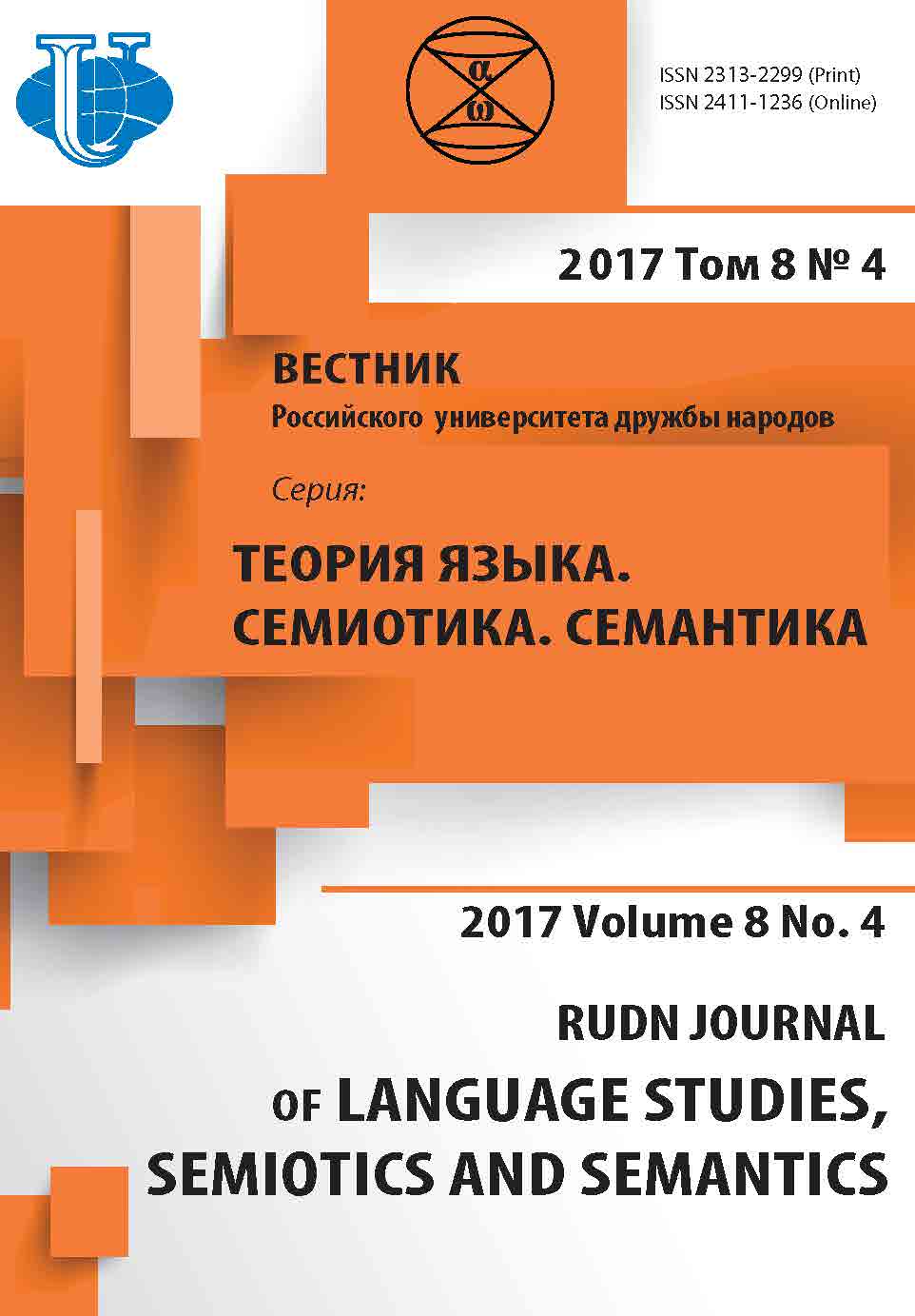THE STRUCTURE OF THE SEMIOTIC CATEGORY OF TIME IN A LITERARY TEXT (Based on Novel “The Defector (Nevozvrashchenets)” by A. Kabakov)
- Authors: Povalko P.Y.1
-
Affiliations:
- RUDN University
- Issue: Vol 8, No 4 (2017)
- Pages: 1237-1248
- Section: ARTICLES
- URL: https://journals.rudn.ru/semiotics-semantics/article/view/18002
- DOI: https://doi.org/10.22363/2313-2299-2017-8-4-1237-1248
- ID: 18002
Cite item
Full Text
Abstract
The article considers time as the most important semiotic and linguopoetical category of a literary text. The text of A. Kabakov's novel “The Defector (Nevozvrashchenets)” is used to analyse the structure of the temporal category in its semiotic dimensions, namely semantics and pragmatics. It is shown that the contents of semantic fields, which reflect the category of time in the novel, the intersec-tion and interplay between these fields and pragmatic relations based on author's attitudes and reader's interpretation, establish a multi-layered, hierarchical structure of temporality in the fictional text. Moreover, the semantics of fictional time is primarily explained by lexico-grammatical and syntactic linguistic units, while, in terms of pragmatics, the crucial modes of expression are the text organization and the context of the author's intention and the reader's perception. Thus, it is emphasized that the time within fictional text is broader than the time in the language. The results of the text analysis demonstrate how important it is to examine fictional texts from the semiotic viewpoint. It appears that a simultaneous considering of semantics and pragmatics of a text and their correlation and interaction permits us to go beyond the “narrow” grammatical opinion when analys-ing such a complex text category as the time. Taking in consideration linguistic, philosophical, cultural and socio-historical contexts, the researcher expands the boundaries of analysis, increases its authenticity and obtains an opportunity to disclose and interpret all the meanings embedded by the author.
Keywords
About the authors
Polina Yu Povalko
RUDN University
Author for correspondence.
Email: Polina.povalko@gmail.com
Povalko Polina Yurievna, Assistant of the General and Russian Linguistics Department the Faculty of Philology, RUDN University, Moscow; Interests: semiotics, cognitive linguistics, philological hermeneutics, text analysis
Miklukho-Maklaya str., 10-2а, Moscow, Russia, 117198References
- Ayupova, S.B. (2012). Time and space categories in the Language Literary World View (based on the prose of I.S. Turgenev); [dissertation]. Ufa. (in Russ.).
- Barg, М.А. (1984). Categories and methods of historical science. Moscow: Naukа. (in Russ.).
- Bakhtin, M.M. (1975). Forms of time and of the chronotope in the novel. Questions of Literature and Aesthetics. Moscow: Hudozhestvennaja literatura. pp. 234—407. (In Russ.).
- Bulahovskij, L.A. (1975). A Historical Commentary to the Literary Russian Language. Moscow: Vysshaja shkola. (In Russ.).
- Zemskaya, E.A. (2000). Novoyaz, new speak? Nowomowa.. What's next? E.A. Zemskaya (editor) Russian language of the end of XX centyry (1985—1995). Moscow. 19—25. (In Russ.).
- Kabakov A. (1990). The defector (Nevozvrashchenets). Moscow: Variant (In Russ.).
- Kozhina, M.N., Duskaeva, L.R. & Salimovskij, V.A. (2008). The Russian Language Stylistics. Moscow: Flinta; Nauka. (In Russ.).
- Lanin, B.A. (1993). Anatomy of literature dystopia, Social sciences and contemporary world, 5. pp. 154—163. (In Russ.).
- Lotman, Yu.M. (1997). Artistic Space in Gogol's Prose. Yu. Lotman. Russian Literature. Saint Petersburg: Iskusstvo-SPB. pp. 621—658. (In Russ.).
- Lotman, Yu.M. (2002). The Semiotics of Culture and the Concept of a Text. In History and Typology of the Russian Culture. Saint Petersburg: Iskusstvo-SPB. pp. 158—162. (In Russ.).
- Maslov, Yu.S. (1990). Time. In Yartseva V.N. (editor) Linguistic encyclopaedically dictionary. Moscow: Sovetskaja jenciklopedija. (In Ru ss.).
- Papina, A.F. (2002). Text its unity and global categories Tutorial. Moscow: Editorial URSS. (In Russ.).
- Potapova, T.V. (2009) Diachrony of the verb's time category (on the material of th e Russian language and languages of different systems): Extended abstract of candidate’s thesis. Rostov-na-Donu. (In Russ.).
- Romanenko, A.P. (2003). Soviet verbal culture: rhetorician image. Moscow: Editori al. URSS. (I n Russ.).
- Florensky, P.А. (1993). Analysis of spatiality and time in pictorial works. Moscow: Progress. (In Russ.).
- Yakovleva, E.S. (1994). Fragments of Russian Language Outlook of the World: Space. Time. Perception. Moscow: Gnosis. (In Russ.).
Supplementary files












